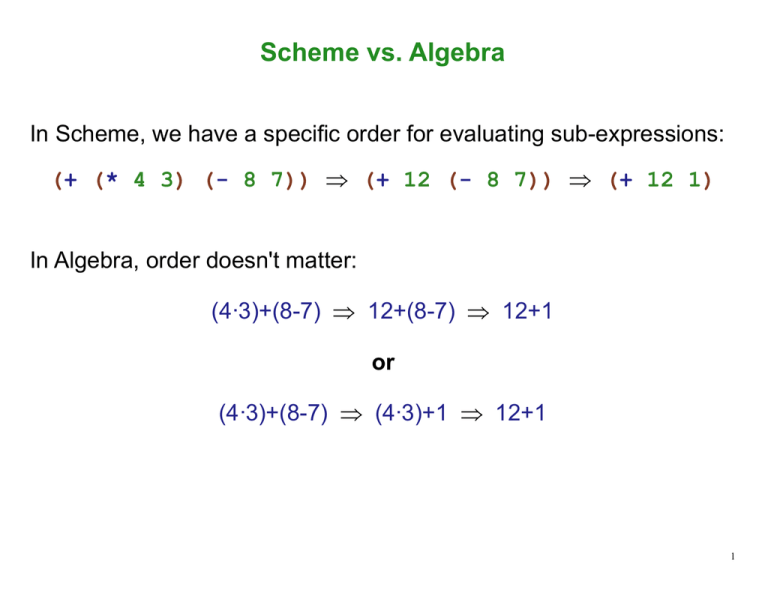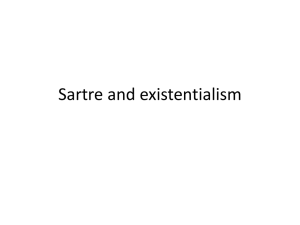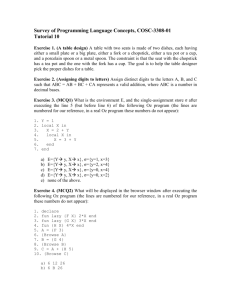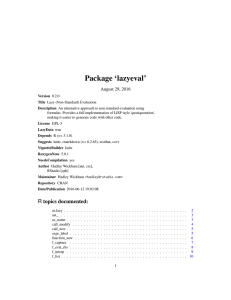Scheme vs. Algebra In Algebra, order doesn't matter:
advertisement

Scheme vs. Algebra In Scheme, we have a specific order for evaluating sub-expressions: (+ (* 4 3) (- 8 7)) ⇒ (+ 12 (- 8 7)) ⇒ (+ 12 1) In Algebra, order doesn't matter: (4·3)+(8-7) ⇒ 12+(8-7) ⇒ 12+1 or (4·3)+(8-7) ⇒ (4·3)+1 ⇒ 12+1 1 Algebraic Shortcuts In Algebra, if we see f(x, y) = x g(z) = ... f(17, g(g(g(g(g(18)))))) then we can go straight to 17 because the result of all the g calls will not be used But why would a programmer write something like that? 2-3 Avoiding Unnecessary Work ; layout-text : string w h -> pict (define (layout-text txt w h) (local [(define lines ; lots of work to flow a paragraph ...)] (make-pict w h (lambda (dc x y) ; draw paragraph lines ...)))) ... (define speech (layout-text "Four score..." 800 600)) ... (pict-width speech) 4 Avoiding Unnecessary Work ; read-all-chars : file -> list-of-char (define (read-all-chars f) (if (at-eof? f) empty (cons (read-char f) (read-all-chars f)))) ... (define content (read-all-chars (open-file user-file))) (if (equal? (first content) #\#) (process-file (rest content)) (error 'parser "not a valid file")) 5 Recursive Definitions ; numbers-from : int -> list-of-int (define (numbers-from n) (cons n (numbers-from (add1 n)))) ... (define nonneg (numbers-from 0)) (list-ref nonneg 10675) 6 Lazy Evaluation Languages like Scheme, Java, and C are called eager • An expression is evaluated when it is encountered Languages that avoid unnecessary work are called lazy • An expression is evaluated only if its result is needed 7 Lazy Evaluation in DrScheme plai-lazy.plt adds a PLAI Lazy language to DrScheme In the Choose Language.. dialog, click Show Details and then Syntactic test suite coverage (Works for both eager and lazy languages) • Green means evaluated at least once • Red means not yet evaluated • Normal coloring is the same as all green 8 Interepreter in Lazy Scheme Doesn't work because result of set-box! is never used: (define (interp a-rcfae sc) (type-case RCFAE a-rcfae ... [rec (bound-id named-expr body-expr) (local [(define value-holder (box (numV 42))) (define new-sc (aRecSub bound-id value-holder sc))] (begin (set-box! value-holder (interp named-expr new-sc)) (interp body-expr new-sc)))])) 9 Interepreter in Lazy Scheme Working implementation is actually simpler: (define (interp a-rcfae sc) (type-case RCFAE a-rcfae ... [rec (bound-id named-expr body-expr) (local [(define new-sc (aSub bound-id (interp named-expr new-sc) sc))] (interp body-expr new-sc))])) 10




